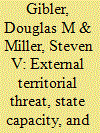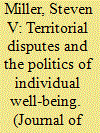|
|
|
Sort Order |
|
|
|
Items / Page
|
|
|
|
|
|
|
| Srl | Item |
| 1 |
ID:
134155


|
|
|
|
|
| Publication |
2014.
|
| Summary/Abstract |
We argue that the regional threat environment a state faces plays a consequential role in its political development and the likelihood of experiencing future intrastate wars. Challenges to a state's territorial integrity lead governments to increase their military personnel, and the resources that support these increases most often come willingly from a public that seeks security. Territorial threats are unlike other types of threats because they challenge individual lives and livelihoods, which both connects the average citizen with the state and allows for easier government extraction of necessary resources. Thus, external territorial threats increase state capacity by unifying the state and by increasing the repressive power of the central government. We identify territorial threats as both latent and realized claims against state territories and find that the presence of an external threat to territory leads to an increase in the capacity of central governments to connect and extract from its citizens, as well as the capacity to repress potential regime dissidents. We also find that the presence of a claim against a state's territory from a neighbor corresponds with a substantial decrease in the likelihood of intrastate conflict at both high and low levels of intensity. The effect of territorial threat is observed even in the short term after a territorial threat has been resolved. Our tests, using standard models of state capacity and insurgency models of conflict on a sample of all states from 1946 to 2007, are robust to multiple model specifications.
|
|
|
|
|
|
|
|
|
|
|
|
|
|
|
|
| 2 |
ID:
120125


|
|
|
|
|
| Publication |
2013.
|
| Summary/Abstract |
Recent scholarship suggests that democracies tend to fight shorter conflicts that can be easily won. This is most likely due to the accountability incentives that constrain democratic leaders. Fearing removal from office, democratic leaders will try to choose short conflicts against weaker opponents. The authors question this argument by presenting an alternative explanation for the connection between democracy and shorter disputes and victories. Building on prior works that have identified a territorial peace, this article argues that democracies often have few territorial issues over which to contend. In fact, rarely do democracies have territorial disputes with their neighbors. Thus, democracies have less difficult issues to resolve, and this makes conflict escalation less likely against neighbors. Without neighbors ready to attack the homeland, states at territorial peace can more easily choose favorable conflicts to escalate. This logic applies to all states at territorial peace, of which democratic states are just a subset. Analyses of directed-dispute dyads between 1816 and 2001 provide confirmation for our argument. Regime type does not predict conflict selection or victory once controls are added for issue salience.
|
|
|
|
|
|
|
|
|
|
|
|
|
|
|
|
| 3 |
ID:
124979


|
|
|
|
|
| Publication |
2013.
|
| Summary/Abstract |
Multiple studies argue that the division of territory between states is a root cause of war in the international system. This is often understood as a function of the unique importance of territory at the level of the individual citizen, because the territory itself directly affects an individual's well-being on multiple dimensions. As such, disputes over territory should also have consequences for an individual's overall subjective appraisal of their well-being. This article argues that disputes over the allocation of territory between states do affect an individual's subjective well-being, but not uniformly. Citizens in states routinely targeted by a territorial threat from a revisionist neighbor are generally unhappy. However, citizens in states that initiate territorial disputes are happier as a result of the aggressive foreign policy of the state leader to secure the coveted territorial good. This is first demonstrated using mixed effects modeling on data drawn from the World Values Survey and Correlates of War Militarized Interstate Dispute dataset. In addition, this article provides an illustration of variations in territorial threat and subjective well-being using the case of Nigeria, finding that Nigerians were happier when their state was initiating territorial threat against its neighbors and less happy during a period when Nigeria itself was the target of territorial threat. The analyses provided advance the territorial conflict research program by measuring the individual-level effects of territorial disputes. In addition, the findings add to a growing scholarship on the political determinants of an individual quality of life, sometimes considered the 'ultimate dependent variable' in social science.
|
|
|
|
|
|
|
|
|
|
|
|
|
|
|
|
|
|
|
|
|